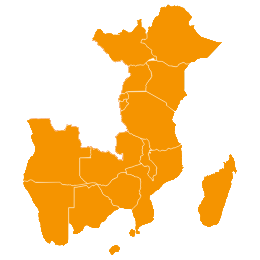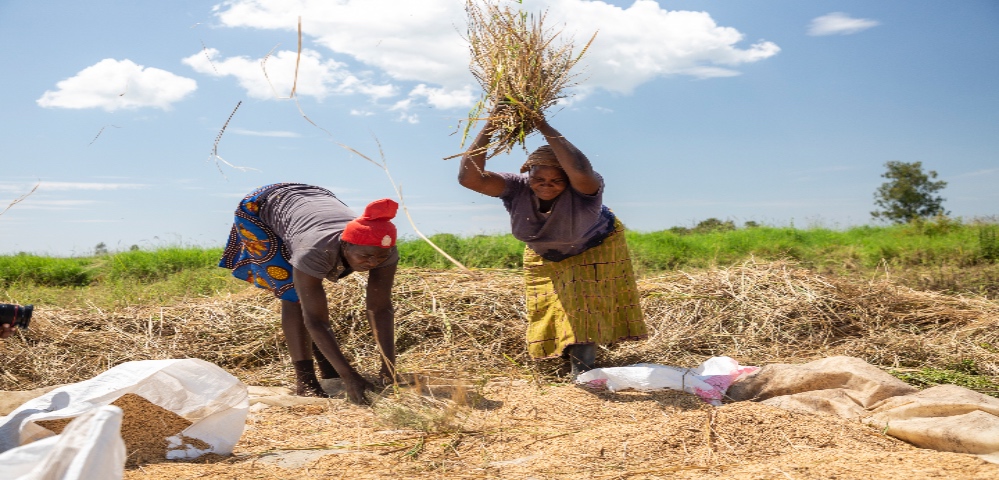Mechanizing production
“Thank you very much, I have never handled such a large amount of money in my entire life!”
Wilfrida Oduar, SianyCC3 scheme – Kisumu county, while receiving money accrued from paddy sales.BACKGROUND
A lack of mechanization means that farmers lose thousands of hours each year preparing land and growing crops on small farms. However, machinery designed for larger farms is inefficient andunaffordable. Nyabon’s solution entails selling, financing and supporting low- horsepower tractors in a way that integratesmechanization with good agronomic practices, credit institutions and produce markets. It uses incentives for all players to achieve results and improve the livelihoods of smallholder farmers.
WHAT’S INVOLVED
Mechanization of smallholder farms involves:
- Packaging and selling low-horsepower tractors targeted at specific crop value chains.
- Models including 13-horsepower walking tractors (with two wheels) and 22- to 29-horsepower compact tractors (with four wheels), all diesel-powered and packaged with associated implements. These tractors are suitable for farms of 0.5–5 acres and can help with land preparation, weeding, threshing/winnowing, canal maintenance and transport
- Bringing together different partners to enable profitable and sustainable production of specific crops, focusing at the moment on rice production in western Kenya.
EXPLORE THIS SOLUTION
To date, this mechanization program has conferred the following benefits:
- Direct or indirect impact on around 30,000 households
- Increased crop yields and rice quality with a simultaneous reduction in production costs
- Better linkages to finance and markets, leading to net profit margins of over 30 per cent and sustained cashflows.

Countries involved
Kenya, Rwanda
Project partners
Farmers’ organizations: SianyCC3 Self Help Group, Nyando Modern Farmers’ SACCO Millers/processors: Lake Basin Development Authority and West Kenya Rice Mills Farm inputs suppliers: Bayer EA and CFAO Kenya Financial institutions: KCB, AFC and Equity banks NGOs and public authorities: Kilimo Trust, Kisumu County, National Irrigation Authority.
Project dates
2016 to present
Share this solution
Bookmark this solution
BookmarkShow Full Solution
Summary
Nyabon Enterprises Ltd. has developed a business model that centers onproviding low-horsepower tractors and accompanying implements to smallholderfarmers so they can effectively mechanize production and primary processing ontheir farms. The model combines farm mechanization with linkages to finance and markets, and it has seen paddy rice farmers enjoy significantly increased crop yields while keeping production costs low.
Challenge/problem
Smallholder farmers in Africa currently have little access to low-horsepowertractors and accompanying implements that are appropriate for their plots. The lackof appropriate mechanization means most farmers resort to manually performingmost farm operations – from land preparation to crop threshing – translatingto lower productivity, limited ability to open up farm land and millions of hours lost every year to the drudgery of manual labor. Current machinery, whileappropriate for larger acreages, tends to be much less efficient for smaller plots. It is also unaffordable for the great majority of smallholder farmers in Africa.
The Solution
Nyabon’s solution entails packaging and selling low-horsepower tractors targeted atspecific crop value chains. The tractors and appropriate implements are madeavailable to farmers in a holistic way that combines mechanization with goodagronomic practices, linkages to credit institutions and linkages to produce markets.The available models are typically 13-horsepower walking tractors (with twowheels) and 22- to 29-horsepower compact tractors (with four wheels), all diesel-powered and packaged with associated implements. These tractors are suitable for farms of 0.5–5 acres and can be used for land preparation, weeding, threshing/winnowing, canal maintenance and transport. If required, Nyabon can also provide larger specialized equipment. Nyabon convenes partners who can enable smallholder farmers to profitably and sustainably increase production of specific crops. Focused on rice production inwestern
Kenya, Nyabon works together with key partners including:
- Farmers’ organizations such as SianyCC3 Self Help Group and Nyando Modern Farmers’ Savingsand Credit Cooperative Organization (SACCO), which help recruit and organize farmers;
- Millers and processors (such as the Lake Basin Development Authority and West Kenya Rice Mills), who buy the paddy;
- Farm inputs suppliers (including Bayer East Africa and CFAO Kenya), which supply Nyabon with bulk inputs to be distributed to farmer organizations;
- Financial institutions such as Kenya Commercial Bank (KCB), the Agricultural Finance Corporation(AFC) and Equity Bank, which provide farmers with working capital to purchase inputs and services;
- NGOs and local authorities, including Kilimo Trust and Kisumu County, which provide capacity-building for farmers and their organizations; and Irrigation water providers (the National Irrigation Board).
IMC’s Worldwide-Connect To Grow program and the International Fertilizer Development Center’s (IFDC)Toward Sustainable Clusters in Agribusiness through Learning in Entrepreneurship (2SCALE) program were instrumental in helping Nyabon develop its business model. They also provided much-needed grantfunding to procure equipment and pilot tests.
Results
To date, Nyabon has directly or indirectly reached around 30,000 households. As a result of theiradoption of both mechanization and good agronomic practices, Nyabon’s clients have significantly increased the amount and quality of rice produced while also reducing their production costs. Betterlinkages to finance and markets have also been benefitted farmers. Net profit margins of over 30 per cent have been attained, producing sustainable cash flow. Overall, food security in the areas served byNyabon has significantly improved, as have farmers’ incomes from selling their surpluses.
Lessons learned
As the Nyabon model was developed, a number of insights crystallized that are relevant to the restof Africa. Firstly, mechanization should not be promoted as a silver bullet but rather as an integralcomponent of the sustainable development of crop value chains. In addition to understanding power requirements and responding with appropriate mechanization solutions, other factors that impede crop value chain development also need to be addressed. These include poor farm infrastructure, weak farmers’ organizations and cooperatives, low adoption of good agronomic practices and weak linkages tofinance and markets. From a policy perspective, governments should only be involved in creating an enabling environment by encouraging mechanization and financing. Otherwise, packaging anddelivering solutions should be left to the private sector. To incentivize small and medium-sizedenterprises to develop and drive innovations, deliberate initiatives that help them mature and grow need to be scaled up via private capital.
Next steps
Nyabon Enterprises’ short-term plan is to rapidly increase the acreage of paddy rice farmed under the model. In parallel, the model will be adjusted to include soybean, sorghum, cotton and other crop value chains.Nyabon’s targets for the next three years include covering at least 30,000 acres of paddy rice andother focus crops, involving more than 25,000 farmers and raising their incomes by an estimated US$32 million. Nyabon will also partner with qualified, well-established agri-businesses and smallholdersupport organizations to develop distribution hubs in Kenya and East Africa that will provide training,demonstration sites, sales and operational support.
Solution Video
Solution Additional Resources
Nyabon Enterprises LtdLast update: 28/05/2021


